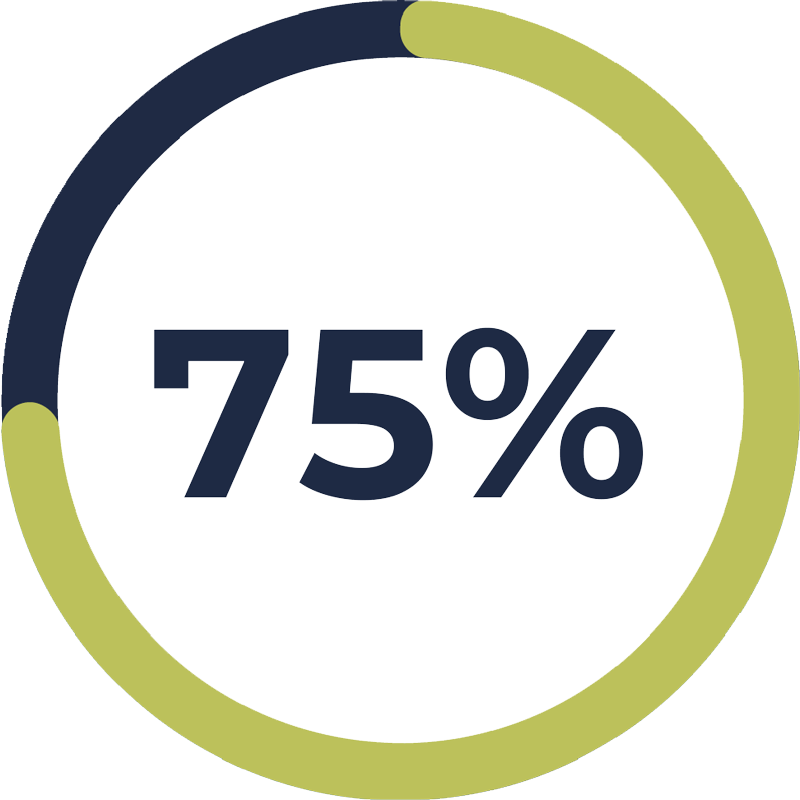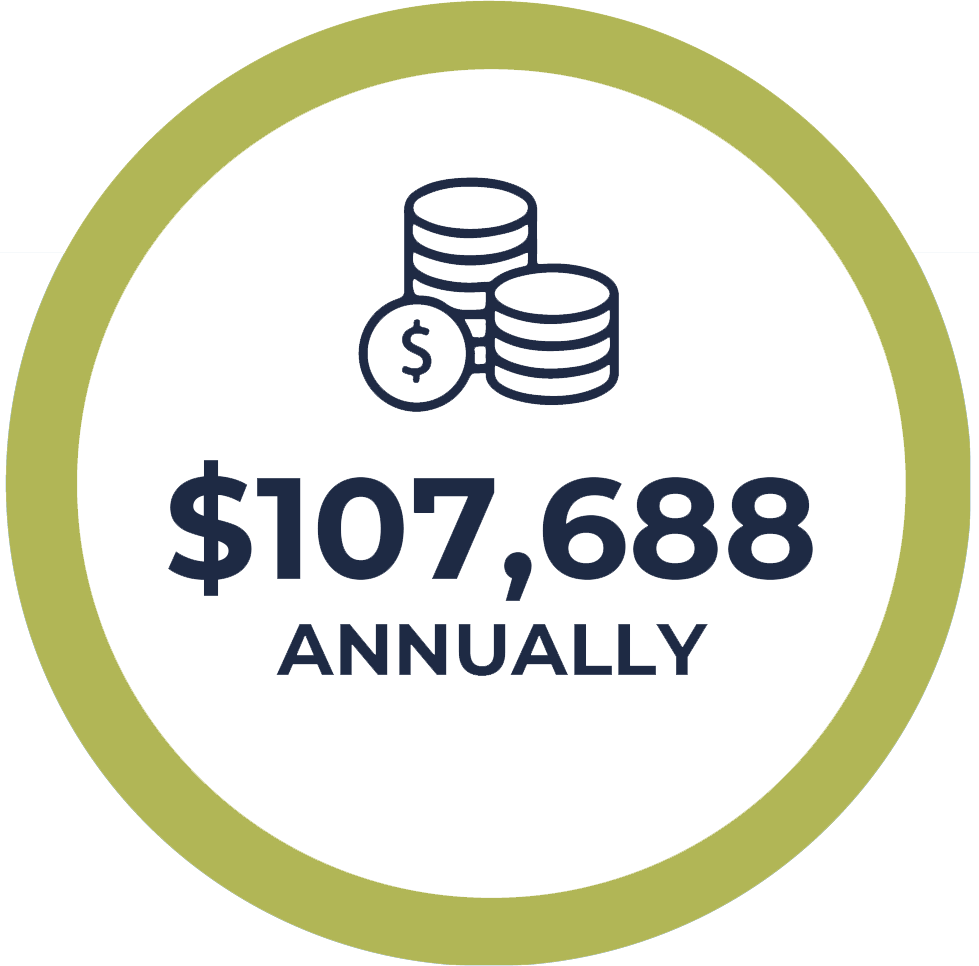DO YOUR FUTURE PLANS SAFEGUARD AGAINST CHANGING NEEDS?
Freedom Village of Bradenton
For more information about the author, click to view their website: Freedom Village of Bradenton
Apr 19, 2023
Florida - Sarasota, Bradenton & Charlotte Counties
Email US
Click to Email UsUnderstanding the likelihood that even older adults in good health may need long-term care as they age can be a pivotal first step in building a dependable plan for the what-if’s of life. So let’s start with this:
That’s the chance healthy 65-year-old couples will have at least one partner who requires significant long-term care as they age.
The baseline for home health care is 44 hours per week
While home health care stands as a preferred option for many, the expense of such services can quickly escalate.
For those 44 hours a week, seniors can expect to pay more than $50,000 annually. However, if more hours of service are needed, home health care can easily and significantly exceed the annual cost of a nursing home.
Is the average cost for 84 hours per week or 12 hours of daily care. If changing needs require 24/7 support, that average annual cost rises to $215,376.
When considering the costs of long-term care — whether provided at home or in a nursing facility — it’s important to also think about the role geography can play. In areas of the country with higher than average overall cost of living, the amount seniors can expect to pay for care services will be higher than the national average.
It’s never too early to look ahead.
Health changes can happen out of the blue. That’s why it’s important to proactively consider how a Life Plan Community and the right insurance can prepare you for whatever tomorrow has in store. Our continuum of services include assisted living, memory care, skilled nursing, and rehabilitation.
Connect with one our senior living consultants today to discuss the value of a community that affords you priority access to on-site health services and significant savings on the rising care costs of the open market. Then speak to your financial planner to see what additional tools, policies or plans may complement the peace of mind Freedom Village of Bradenton provides.
*Facts and figures within this piece have been gathered from HealthView Service’s June 2021 report, “Long-Term Care and Financial Planning.”
Other Articles You May Like
Discover Compassionate Assisted Living at Merritt Island
Choosing an assisted living community is a major decisionfor both seniors and their families. At Merritt Island Assisted Living, we understand that this transition is about more than just a change of address. Its about finding a safe, nurturing environment where each resident can live with dignity, enjoy daily life, and receive the right level of support tailored to their individual needs.Our community is thoughtfully designed to provide personalized care, promote independence, and offer peace of mind through 24/7 assistanceall in a warm, welcoming atmosphere on Floridas beautiful Space Coast.What Is Assisted Living?Assisted living bridges the gap between independent living and full-time medical care. Its ideal for individuals who may need help with daily activitiessuch as bathing, dressing, medication management, and mobilitybut still want to maintain their independence and enjoy a vibrant lifestyle.At Merritt Island Assisted Living, we empower residents to live life on their own terms, while providing the compassionate support they need to thrive.Personalized Support, When Its Needed MostOur assisted living residents receive customized care plans that evolve with their needs. From minimal assistance to more comprehensive support, we adjust our services to ensure comfort, safety, and quality of life. Our professional team is available around the clock, offering help with: Daily living activities (ADLs) Medication management Transportation to appointments Housekeeping and laundry Wellness checks and ongoing assessments We work closely with families and healthcare providers to ensure continuity of care and open communication at every stage.A Lifestyle That Promotes Connection and Well-BeingAssisted living at Merritt Island isnt just about careits about living well. Our residents enjoy a dynamic community life with enriching programs, engaging activities, and social opportunities every day. Whether its participating in group fitness classes, attending social events, enjoying live entertainment, or simply spending time in the garden, our community is built to support the emotional, mental, and physical well-being of every resident.Community Features Include: Private and semi-private apartments Three nutritious, chef-prepared meals per day Beautiful indoor and outdoor common spaces On-site salon and spa services Fitness and wellness programs Calendar of daily social activities and events Scheduled outings and transportation Why Families Trust Merritt Island Assisted LivingFamilies choose Merritt Island because we combine expert care with heart. We treat every resident like familybuilding trust through communication, kindness, and consistent, compassionate service. From the care team to the kitchen staff, everyone shares a commitment to enhancing the lives of those we serve.Schedule a Visit Today If you or your loved one are considering assisted living, we invite you to experience the difference at Merritt Island Assisted Living. Schedule a tour, meet our team, and see firsthand how we help residents live comfortably, confidently, and with purpose.
Exceptional Services & Amenities at Merritt Island Assisted Living
At Merritt Island Assisted Living, residents enjoy more than just a comfortable place to livethey experience a vibrant lifestyle built around convenience, connection, and personalized support. Designed to enhance daily life while promoting independence and peace of mind, our community offers a wide array of services and amenities tailored to meet the unique needs of every resident.Comfort Meets CareFrom the moment you walk through our doors, you'll feel the difference that thoughtful design and attentive service make. Our assisted living community provides 24/7 professional support, ensuring that every resident receives compassionate care while maintaining dignity and independence. Services include: Assistance with daily activities like bathing, dressing, and grooming Medication management and health monitoring Housekeeping, laundry, and linen services Scheduled transportation for medical appointments and local outings With these daily essentials handled by our dedicated staff, residents can focus on enjoying life to the fullest.Lifestyle Amenities That Inspire JoyWe believe senior living should be as enriching as it is supportive. Thats why Merritt Island Assisted Living offers amenities that promote social engagement, mental stimulation, and physical wellness: Chef-prepared meals served three times daily in a comfortable, restaurant-style dining room Fitness and wellness programs designed to keep residents active and energized On-site beauty and barber services, so looking and feeling your best is always convenient Activity and game rooms for socializing, puzzles, cards, and more Spacious common areas for gatherings, celebrations, and relaxation Beautiful outdoor spaces, including courtyards and walking paths perfect for enjoying the Florida sunshine Engaging Activities and EventsMerritt Island Assisted Living encourages residents to remain engaged and connected. Our events calendar is filled with diverse offerings that cater to a variety of interests: Music and movie nights Arts and crafts sessions Educational talks and guest speakers Holiday and birthday celebrations Group outings to local attractions, restaurants, and cultural venues Every activity is designed to bring joy, foster friendships, and enhance the overall well-being of our residents.Safe, Accessible, and SupportiveSafety and accessibility are priorities throughout our community. Our living spaces are thoughtfully designed with seniors in mind, including grab bars, emergency call systems, and mobility-friendly layouts. Residents and families can enjoy peace of mind knowing that assistance is always close at hand.Why Choose Merritt Island Assisted Living?When you choose Merritt Island Assisted Living, youre choosing a lifestyle built around warmth, wellness, and worry-free living. Our community services and amenities are thoughtfully created to ensure residents feel at homewhile receiving the personalized support they need to thrive. Come see how our amenities make every day easier, more comfortable, and more fulfilling. Schedule a tour today and discover the lifestyle you or your loved one deserve.
Merritt Island Assisted Living: Compassionate Care in a Coastal Community
Located in the heart of Floridas scenic Space Coast, Merritt Island Assisted Living offers a warm, inviting community designed to provide exceptional care, comfort, and connection for seniors. Blending modern amenities with a personalized approach to wellness, this assisted living residence is a trusted choice for families seeking quality senior care in a peaceful, coastal setting.A Home-Like Setting with Professional SupportMerritt Island Assisted Living is more than just a place to liveits a place where seniors feel at home. With private and semi-private apartment options, thoughtfully designed common areas, and welcoming outdoor spaces, residents enjoy comfort, safety, and a sense of community.The highly trained staff offers 24/7 assistance with daily living activities such as bathing, dressing, grooming, medication management, and mobility supportalways delivered with respect and kindness. Residents maintain their independence while receiving the right level of care, tailored to their unique needs.Enriching Lifestyles for Every ResidentLife at Merritt Island Assisted Living is active, engaging, and fulfilling. Daily programs and social activities are carefully curated to promote mental, physical, and emotional well-being. Residents can participate in: Group fitness classes Games and trivia nights Arts and crafts Live music and entertainment Off-site outings and scenic drives Holiday celebrations and cultural events Whether it's enjoying a morning walk in the garden, attending a wellness seminar, or sharing stories over coffee, residents find plenty of opportunities to connect, grow, and have fun.Delicious Dining, Every DayNutrition is a key part of wellness, and the culinary team at Merritt Island Assisted Living takes pride in preparing meals that are both nourishing and flavorful. Residents enjoy: Three home-cooked meals daily Accommodations for dietary needs and preferences Restaurant-style dining with flexible seating Snacks and beverages available throughout the day Meals are served in a vibrant dining room that encourages conversation, camaraderie, and a shared sense of community.A Trusted Partner for FamiliesChoosing assisted living is a significant decisionand the team at Merritt Island Assisted Living understands the importance of trust, transparency, and ongoing communication. From the first tour to move-in day and beyond, families receive support every step of the way.The staff works closely with residents and their loved ones to ensure personalized care plans remain up to date and reflective of evolving health needs and personal preferences.Why Families Choose Merritt Island Assisted Living Compassionate care staff available 24/7 Comfortable, accessible living spaces Secure, welcoming environment Enriching activities and wellness programs Convenient location near hospitals, parks, and shopping Peaceful surroundings with beautiful outdoor areas Experience the Difference on the Space CoastSurrounded by natural beauty and a strong sense of community, Merritt Island Assisted Living offers seniors a vibrant lifestyle supported by expert care. Its a place where dignity, independence, and joy are part of everyday life. Schedule a visit today and discover the difference of personalized care in a place that truly feels like home.
Local Services By This Author
Freedom Village of Bradenton Memory Care
Memory Care 6410 21st Avenue West, Bradenton, Florida, 34209Heartfelt CONNECTIONS is a nationally recognized program designed to provide personalized, activity-focused memory care for individuals impacted by Alzheimer's or other dementias. Here's what your loved one can expect and the benefits they can experience:What your loved one can expect:Personalized memory care: Industry-leading care tailored to the unique needs and abilities of each resident, including specialized Alzheimer's care.Assistance with daily living: Help with tasks such as dressing, bathing, and medication management to promote comfort and well-being.Dementia-specific programming: Engaging activities such as arts and crafts therapy designed to stimulate cognitive function and enhance quality of life.Access to community amenities: Enjoyment of amenities such as the salon and barbershop, fitness center, and pool to promote socialization and overall well-being.Small-group activities: Participation in enjoyable group activities within a supportive and intimate environment.Community outings: Regular outings to enhance enrichment and provide opportunities for engagement and socialization.Benefits for your loved one:Promotes dignity and accomplishment: Encourages a sense of pride and achievement in daily activities, fostering dignity and self-worth.Supports engaged eating: Specialized diets and mealtime support to promote enjoyment and nutritional intake.Improves overall well-being: Supports improved self-esteem, reduces fear, anxiety, and frustration, and promotes overall health and well-being.Benefits for you:Peace of mind: Knowing your loved one is receiving the highest quality of care and support.Enhanced relationship: Allows you to focus on cherishing the relationship with your loved one, returning to the loving connection you once shared.Quality time together: Provides opportunities to make the most of your time together, engaging in meaningful activities and interactions.Support for the family: Offers access to resources, counseling, and other services to support you and your family throughout the caregiving journey.Heartfelt CONNECTIONS aims to enrich the lives of individuals with dementia while providing support and peace of mind to their families, fostering a positive and nurturing environment where each resident can thrive.
Freedom Village of Bradenton Skilled Nursing
Skilled Nursing 6410 21st Avenue West, Bradenton, Florida, 34209The Inn at Freedom Village offers 24-hour skilled nursing care designed to provide advanced long-term care with the comfort and support of home. Here's what you or your loved one can expect from our skilled nursing services:Tailored care plans: Residents at The Inn at Freedom Village are treated as treasured family members, and our caring staff takes the time to develop personalized care plans tailored to individual needs. Whether for short-term or long-term stays, we anticipate needs and provide highly personalized care and transition support.Supportive environment: Residents receive care in a supportive environment where their comfort and well-being are prioritized. Our staff assists with activities of daily living, including bathing, dressing, grooming, and medication administration, ensuring residents' needs are met with compassion and dignity.Engaging activities: We encourage residents to stay engaged in activities appropriate for them, offering opportunities for socialization, recreation, and personal enrichment. Our beautifully landscaped gardens and grounds provide serene outdoor spaces for relaxation and enjoyment.Comprehensive amenities: Skilled nursing services and amenities include private or companion suites, all-inclusive monthly fees covering care, living, and dining costs, daily housekeeping and laundry service, and 24-hour nursing care. We also hold regular care meetings with residents and their families to ensure ongoing communication and support.At The Inn at Freedom Village, we are committed to providing compassionate and comprehensive skilled nursing care in a warm and welcoming environment. Our goal is to enhance the quality of life for each resident by meeting their individual needs with personalized care and support.
Freedom Village of Bradenton Independent Living
Independent Living 6406 21st Avenue West, Bradenton, Florida, 34209Freedom Village of Bradenton offers independent living with a wealth of amenities and services designed to enhance your lifestyle. Here's what you can expect as a resident:Freedom from homeownership responsibilities: As an independent living resident, you'll enjoy the freedom of leaving behind the burdens of homeownership. Spend your days as you please, knowing that maintenance and other household tasks are taken care of for you.Vibrant, active lifestyle: Recognized as a 2024 Best Independent Living community by U.S. News & World Report, Freedom Village of Bradenton offers a vibrant, active lifestyle. Explore new interests, connect with neighbors, and enjoy a full social life with a wide range of amenities and activities.Life Plan Community with Life Care contract: As a Life Plan Community, Freedom Village of Bradenton provides convenient access to higher levels of quality on-campus care if needed. With the Life Care contract, you'll enjoy financial predictability and access to a continuum of care, ensuring peace of mind for the future.Resort-like amenities: Residents have access to resort-like amenities and services, including fitness facilities, recreational activities, social events, and more. Nurture connections, explore new learning experiences, and stay active and engaged within the community.Maintenance-free residences: Choose from villa homes or one-, two-, and three-bedroom senior apartments, each with its own private balcony or lanai. Enjoy maintenance-free living and the freedom to personalize your space with your favorite flooring and paint colors.Pet-friendly community: Freedom Village of Bradenton welcomes pets, allowing residents to enjoy the companionship of their furry friends.Experience the freedom, convenience, and enrichment of independent living at Freedom Village of Bradenton, where you can live life to the fullest and feel confident about the future.






